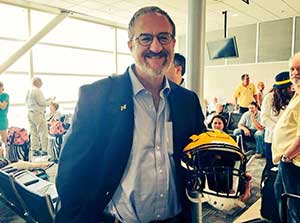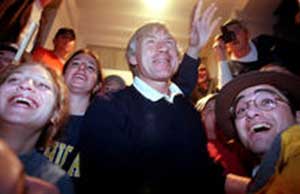Winning
James J. Duderstadt, Michigan’s president from 1988-96, says his predecessors passed one piece of advice down through the decades.
It went as follows: The president of U-M should pray for the Wolverines to win mostof their football games each season, but not all.
As Duderstadt writes in Intercollegiate Athletics and the American University(2000), the president should also “pray that Michigan never, ever,wins its last game. If the football team wins consistently, the alumni, students, and fans remain interested and supportive. But if it loses its last game, Michigan will never end the season ranked so high that folks take athletics too seriously.”
The prayer, if uttered, seems not to have been answered. There have been plenty of losses in the final game of Michigan seasons. But that has seldom spared U-M’s presidents from football-induced headaches.
Indeed, win or lose, football has troubled the tenure of U-M presidents since the game began.
“Think of it!”
James Burrill Angell, president from 1871-1909, was born too early to catch the 20th century’s football fever. He was close to the students, who fondly called him “Prexy,” but he never shared their mania for gridiron glory.In 1896, in an effort to regulate college sports, Angell helped to found the Intercollegiate Conference Athletic Association, known at first as the Western Conference, which Michigan quickly came to dominate.
Under the legendary Fielding H. Yost, the Wolverines scrambled to four straight national championships, 1901-04. When charges flew that Yost was “professionalizing” the college game, his boss was inclined to agree. At Angell’s invitation, faculty representatives from conference schools — the Angell Committee — cut back on game schedules, cracked down on eligibility, and increased faculty control of sports.
Angell said it was high time.
“The public had come to consider that the first 12 weeks of college were for football, with an occasional lapse into intellectual pursuits,” he told U-M alumni in Chicago. “The training of the men as gladiators and the making of the game a great spectacle for thousands of people have been frowned upon justly. The game came to have a different purpose than that of recreation and healthful strife. The boys in school were becoming infected with a wrong idea of what college life really stood for…
“In certain universities the coaches are paid more than members of President [Theodore] Roosevelt’s cabinet or the justices of the Supreme Court. Think of it!”
The conference’s crackdown, which was understood to be targeted chiefly at Michigan, caused such a backlash in Ann Arbor that U-M quit the Western Conference. It took 10 years for the dust to settle. In 1917, the Wolverines finally rejoined a league that now numbered 10 — the Big Ten, as it was known ever after, no matter how many members it actually had.
After the First World War, one of Angell’s sons, James Rowland Angell, was a top candidate to become U-M’s president. When he declared his belief that college football should be outlawed, his name was crossed off the list. He became president of Yale instead.
A “horrifying afternoon”
Angell’s successor, Harry Burns Hutchins, president from 1909-20, stayed away from games at Ferry Field if he possibly could. The cause might be called a mild case of post-traumatic stress disorder.Though he was an undergraduate at Michigan, Hutchins had once attended a game at Cornell in the era when the earliest forms of American football were being played in a rule-free lather of mud and blood. The result was often a pummeling exhibition of mayhem that could cripple the players and shock the spectators.
According to Hutchins’ biographer, the Cornell game that day was “particularly savage and brutally fought,” and he never got over the memory of that “horrifying afternoon.”
As president of Michigan, “he would occasionally attend [football games] if the president of the visiting university honored the occasion by attending, but he did not like it and sat in dread, not of defeat but of casualties.”
Yet Hutchins was not immune to the call of loyalty to his alma mater. On the night before the 1913 Michigan-Penn game, he was invited to address a pep-rally crowd in Hill Auditorium, which had just been dedicated. Though he was known as a ponderous speaker, he touched the crowd with a flash of emotion.
“A man would be dead if proceedings like these did not stir him,” he said. “My heart is with you.”
“An emotional release”
Alexander Grant Ruthven’s deepest interests ran to the genetic differences between various strains of garter snake. So he was not quite the type to hoist a frosty beverage at the Pretzel Bell after another stellar performance by Old 98, Tom Harmon, who starred during Ruthven’s presidency (1929-51).For Ruthven, football was just one more nuisance that pulled him out of his laboratory and into the line of fire. Whether the team was winning or losing, he complained, the president would catch flak.
“The football team will usually win or lose each contest,” he remarked in his memoirs, with characteristic dryness. “When it loses, there is something rotten nearer than Denmark. The entrance requirements are too high, the training is faulty, there is trouble on the team, the coach is losing his grip, and so ad infinitum.When the season is successful, there are murmurings about pipe courses, low standards of admission, and subsidization, or a demand for postseason games.
“It does not seem to occur to many fans that for most spectators athletic contests are an emotional release and nothing else, that the game is being played by boys, and that one team must win and one team must lose, except in the rare case of a tie.”
Partying with the prez
If you mention President Lee Bollinger and Michigan football in the same sentence, the average fan will conjure a scornful memory of the “Halo,” a bright yellow oval that was tacked to the rim of the Big House in 1998 by hotshot architects at Bollinger’s invitation.
Widespread public sneers led to the Halo’s unceremonious removal after a brief spell of unpopularity, and Bollinger took the blame for having approved it without due regard for the stadium’s “special public character.”
Yet somewhere there are hundreds of Michigan alumni with a different and distinctly pleasant memory of Bollinger’s connection to the football program.
The day was Saturday, Nov. 8, 1997. Michigan had just upset a heretofore-undefeated Penn State squad on the road to the Rose Bowl and a national championship.
According to The Michigan Daily,a mass of students meandering home from the stadium congregated on the lawn in front of the President’s House — at least a thousand in all, the Daily estimated. A chant began: “We want Lee… we want Lee…”
Stay here as long as you want…
Inside, Bollinger and his wife were watching the game’s aftermath on TV. Instead of calling the University cops to send the crowd homeward, the president opened the front door and called: “You can stay here as long as you want … and come inside!”
They did — hundreds of students who roamed through the President’s House, downstairs and up.
More than 10 years later, a Kinesiology grad named Bob Lehrer told the Daily:“I sat on Lee Bollinger’s bed and was watching football on TV. I called from his phone to my answering machine and left a message. He gave me a hug and on the way out he said he loved us all.”
Later, Bollinger told the Dailyhis unexpected guests had left the place in good order, though a couple of students claimed to have lifted a bottle or two of beer from the presidential fridge.
Sources included James J. Duderstadt,Intercollegiate Athletics and the American University (2000), Kent Sagendorph,Michigan: The Story of the University (1948); Shirley W. Smith,James Burrill Angell: An American Influence (1954); Shirley W. Smith,Harry Burns Hutchins and the University of Michigan (1951); Alexander Grant Ruthven,Naturalist in Two Worlds (1963); “Lee C. Bollinger: The Legacy of the University of Michigan’s Twelfth President,” Michigan Daily, 10/2/2001; Kyle Swanson,“Partying With the President,” Michigan Daily, 9/9/2008.

![[L-R: UM Ath. Director Fielding Yost, UM President C.C. Little, Michigan Governor Fred Green, OSU Ath. Dir. L.W. St. John, Ohio Governor Vic Donahey]](https://michigantoday.umich.edu/wp-content/uploads/sites/89/mc-image-cache/2016/09/pigskins-feat-9-16.jpg)



